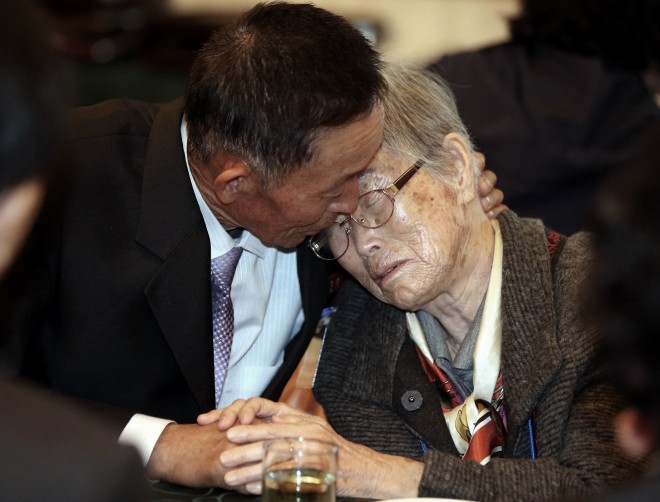
North Korean Han Son Il, left, hugs with his South Korean mother Lee Kum-seok to bid farewell after the Separated Family Reunion Meeting at Diamond Mountain resort in North Korea, Monday, Oct. 26, 2015. Parents and children, brothers and sisters and other relatives separated by the Korean war wept and hugged each other as they parted after their brief reunions, most for the first time in more than six decades. (Kim Do-hoon/Yonhap via AP) KOREA OUT
SEOUL — The South Korean Red Cross said Wednesday it was offering therapy and counselling to hundreds of people who took part in a recent, emotionally fraught reunion with North Korean relatives they hadn’t seen in 60 years.
During the October 20-26 reunion in a North Korean mountain resort, nearly 650 South Koreans — many of them very elderly — met for the first time with family members they were separated from during the 1950-53 Korean War.
The joy of the reunion was tempered by the wrenchingly brief time the relatives could spend with each other — just 12 hours in total — and the agony of the final and, for most, permanent farewell at the end.
It was only the second such event to be held in five years and followed a similar gathering at the same resort in February 2014.
After that reunion, the Red Cross said more than 20 percent of those who participated had called for help, saying they had been left stressed, depressed and unable to sleep properly.
“So last year we started the program to try and ease their suffering… mostly just by visiting them as many times as they wanted and listening to their stories,” a Red Cross spokesman said.
A team of volunteers and therapists will visit each of the participants in last week’s reunion, checking if they have any difficulties sleeping or eating, and if they feel depressed or find themselves smoking or drinking more than usual.
Those who exhibit any worrying symptoms will be referred to area psychologists, the spokesman said.
Many elderly participants in previous reunions have seen their health deteriorate after the emotionally draining events.
A 91-year-old South Korean who took part in last year’s meet had to be brought home earlier than scheduled after suffering from stress and exhaustion. He died about a month later.
Millions were separated from their families after the Korean conflict that sealed the division of the peninsula.
Most died without seeing or hearing from their families on the other side of the border across which all civilian contacts are banned.
RELATED STORIES
Families gather for rare North, South Korea reunion
Korean reunions: too much politics, too little time